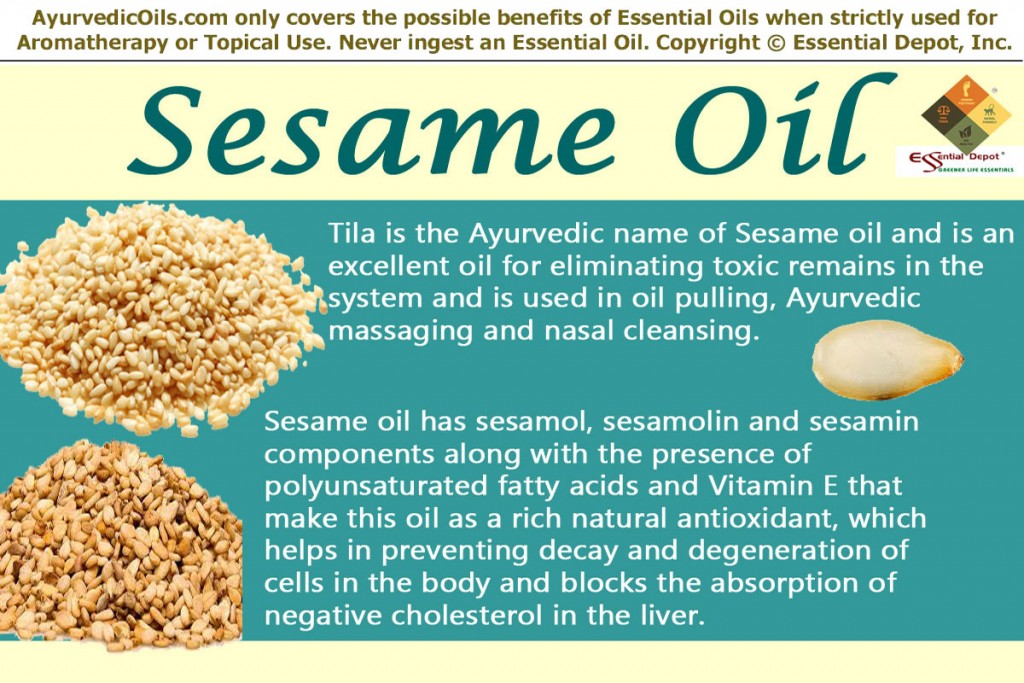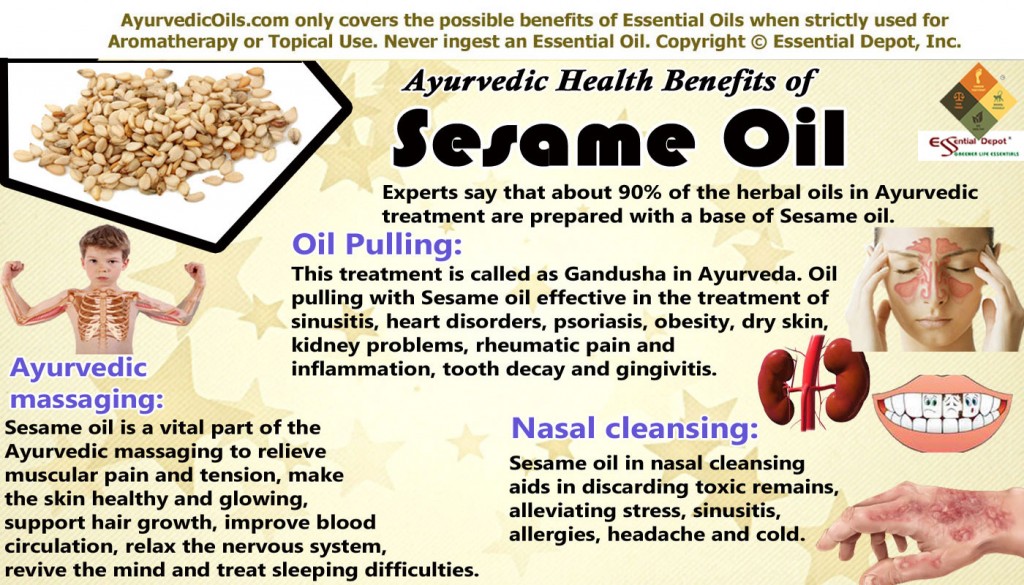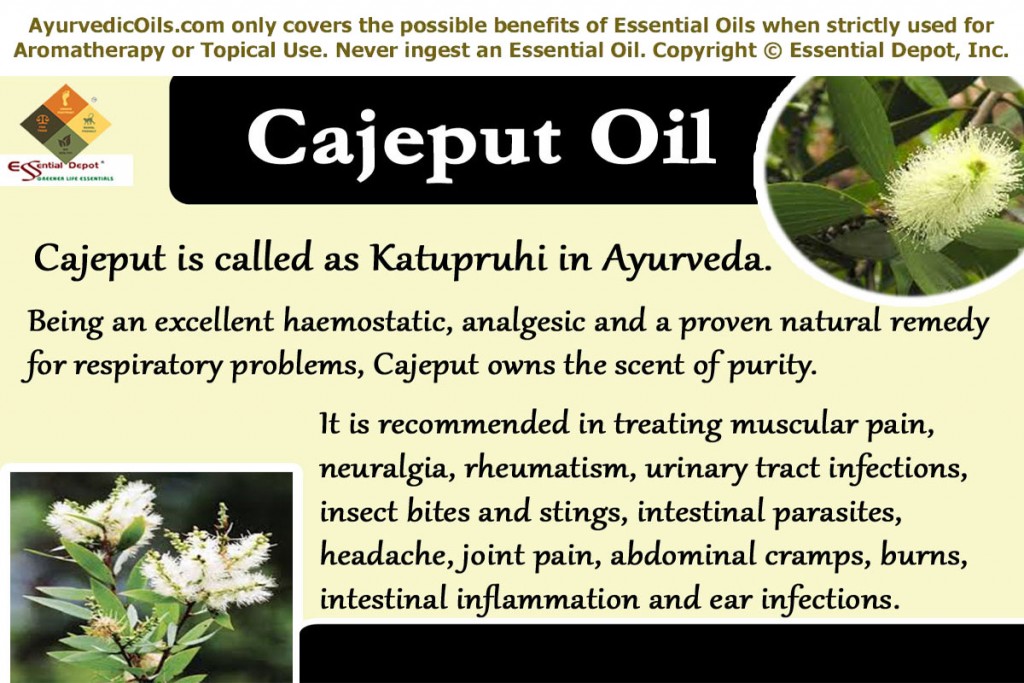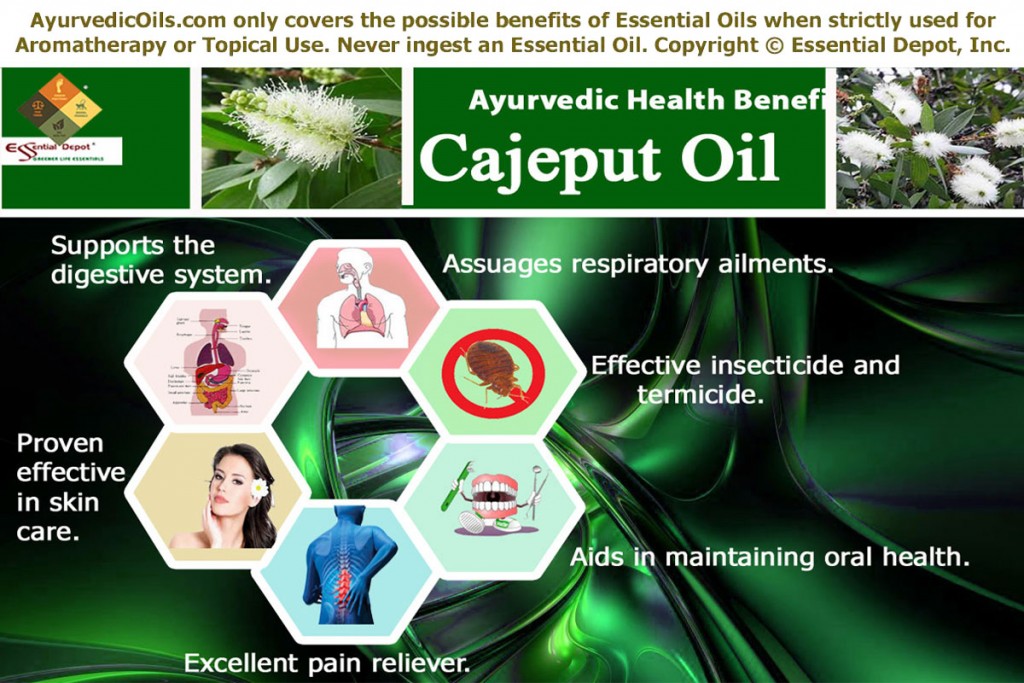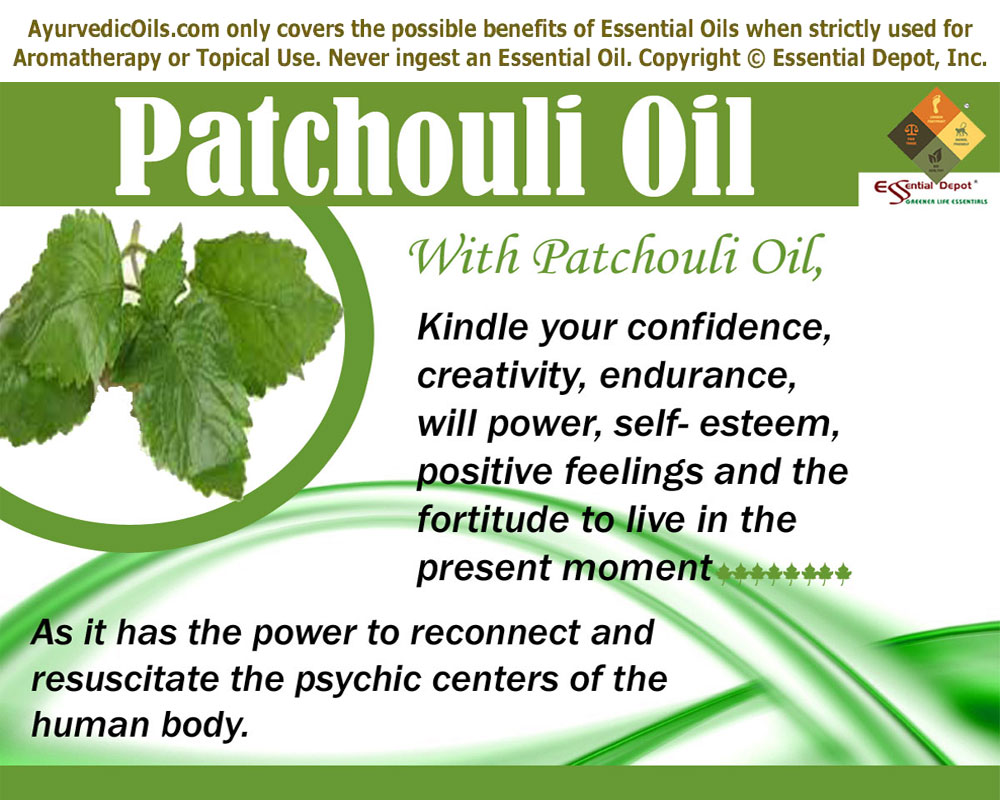 Patchouli essential oil, the phenomenal oil with extraordinary health benefits is often neglected and fails to attract the aroma lovers unlike Lavender and Rose oils, as many believe that it has a strong misty fragrance.
Patchouli essential oil, the phenomenal oil with extraordinary health benefits is often neglected and fails to attract the aroma lovers unlike Lavender and Rose oils, as many believe that it has a strong misty fragrance.
If you ask me the best thing about Patchouli oil, I would rather say that it is an instant remedy for fighting and fixing anxiety and help you stay relaxed all day long when rubbed on your wrist as a stimulating perfume.
Mesmerized with its enlivening fragrance, I would ask you to wear the aroma of Patchouli essential oil on your wrists as it will help you better to fight the challenges of your busy day better than your wrist watch could do.
Patchouli is an Indian name, meaning ‘Green leaf’ (Patch-green and ilai-leaf). Many of us still remember Patchouli as the significant incense of the 60s and 70s but the truth is that Patchouli oil has its roots vested deeply in the field of Ayurveda for more than 5000 years for treating innumerable health conditions since the primordial times.
Purchase Patchouli Essential Oil – Retail – CLICK HERE
Purchase Patchouli Essential Oil Indonesia – Wholesale – CLICK HERE
Immemorial history of Patchouli Essential oil:
Scientifically known as Pogostemon cablin, this herb is a member of the mint family, Labiatae and is native to India, Malaysia and Indonesia. The essential oil is steam distilled from the young leaves of this plant. Patchouli and its oil are often associated to the sixties where it was used by people to cover up the smell of their smoking. It was traditionally used as an effectual aphrodisiac in perfumes and as a powerful moth repellant.
The ancient Indians used Patchouli in shawls and linens traded to Britain in 1800s to generate a unique aroma and for its germ-killing effects. It was also used as an important constituent for scenting Indian inks. This herb and its essential oil are of high religious importance as it is still trusted to keep away pessimism, negative feelings and evil powers.
Patchouli essential oil is the major ingredient of the tribal prescriptions for treating poisonous snake bites, bites and stings of various insects including mosquitoes and other animals. For mosquito bites and stings of other insects, mix 2 drops of Patchouli oil with 6 drops of carrier oil like coconut oil and apply on the affected part for complete healing.
For venomous snake bites like King Cobra’s bite, few drops of pure Patchouli oil is taken on a cloth or cotton and put on the bitten part instantaneously as first aid before the patient is taken to the doctor for intense treatment. After which 2 drops of Patchouli oil is mixed with 4 drops of carrier oils like coconut oil, sesame oil, wheat germ oil or grape seed oil and applied on the bitten surface twice daily to promote quicker healing of the wound.
Chemical constituents or Gas Chromatography Report of Patchouli oil:
According to the Gas chromatography report, Patchouli oil constitutes of 8 chemical components that contribute to its magnificent aroma, remedial properties, consistency and quality.
Just click on:
- Patchouli alcohol
- alpha-Bulnesene
- beta-Caryophyllene
For knowing more about the detailed information of these key constituents of Patchouli essential oil.
The table below on the Gas Chromatography report talks about the chief chemical components and its role in granting the therapeutic and other attributes to Patchouli oil.
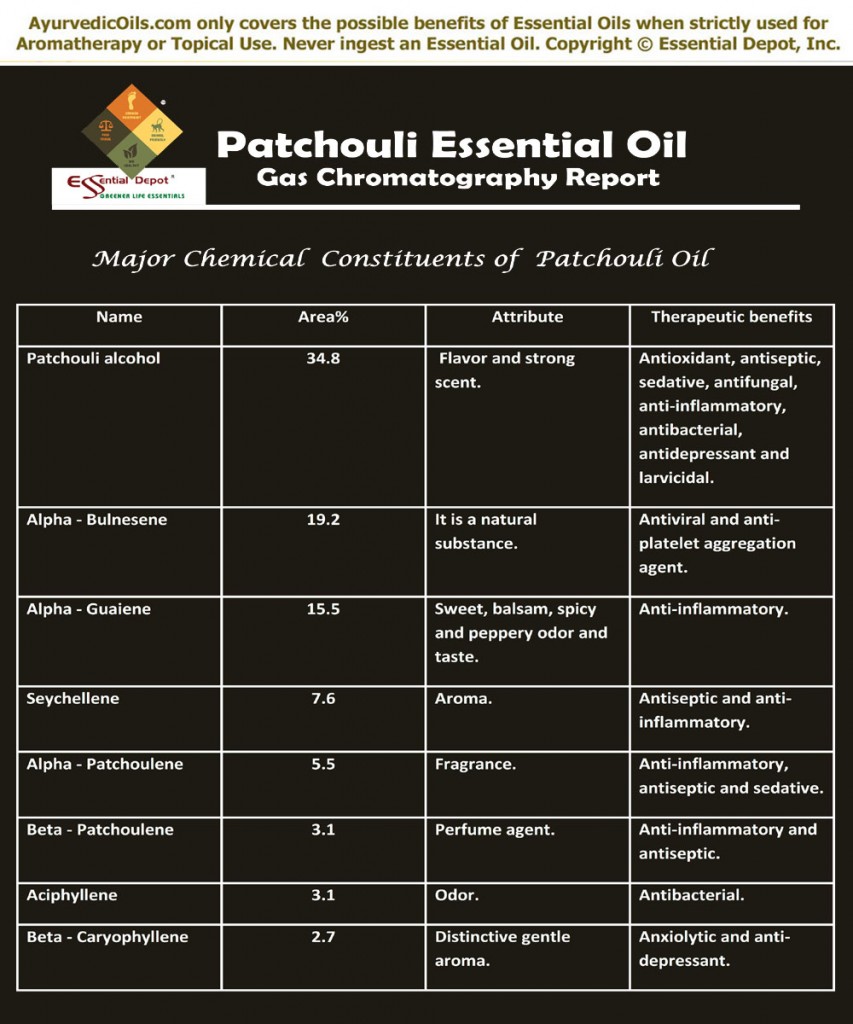 The chemical constituents responsible for the healing values of this oil are a-patchoulene, b-patchoulene, a-bulnesene, a-guaiene, norpatchoulenol, pogostol, caryophyllene, seychellene and patchouli alcohol (comprises of cadinene, luglviol, patchoulol, aldehydes, cinnamic, benzoic, evenol and phenol).
The chemical constituents responsible for the healing values of this oil are a-patchoulene, b-patchoulene, a-bulnesene, a-guaiene, norpatchoulenol, pogostol, caryophyllene, seychellene and patchouli alcohol (comprises of cadinene, luglviol, patchoulol, aldehydes, cinnamic, benzoic, evenol and phenol).
Therapeutic properties and growing importance of Patchouli oil:
The National Bank for Agriculture and Rural Development (NABARD) in India stated about the importance of Patchouli and its essential oil in its report submitted on Medicinal and Aromatic plants. According to this report Patchouli has developed extensively as a prominent aromatic plant and every year, the world consumes about 1000 Metric Ton of Patchouli essential oil.
The predominant therapeutic properties of Patchouli essential oil are aphrodisiac, antidepressant, antiphlogistic, cytophylactic, astringent, diuretic, deodorant, antiseptic, decongestant, anti-inflammatory, fungicide, cicatrisant, relaxant, febrifuge, sedative, insecticide and tonic.
Ayurvedic health benefits of Patchouli essential oil:
Ayurveda, the ancient medicinal system with its origin in India has the longest history in the field of medicine for more than 5000 years.
Ayurvedic texts define health as a perfect harmony between the emotional, physical and spiritual wellness of an individual to which his diet, lifestyle and other innumerable factors contribute to. This noble science aims at disease prevention rather than treating the disease at the disrupting stage.
Ayurveda trusts that every individual is made up of three energy elements known as doshas. The book’ Absolute Beauty’ by Pratima Raichur defines dosha as “metabolic principles governing mind and body; the intelligence of the body- mind”. These doshas are a combination of the five elements namely air, water, ether, earth and fire. Imbalance of any of these doshas ends up in illness or lack of health.
Patchouli essential oil is said to treat kapha deficit and aggravation of vata and pitta. This helps in treating emotional imbalances like depression, stress and anxiety along with numerous skin problems.
The major Ayurvedic health benefits of Patchouli essential oil are:1. Amazing natural oil for skin care: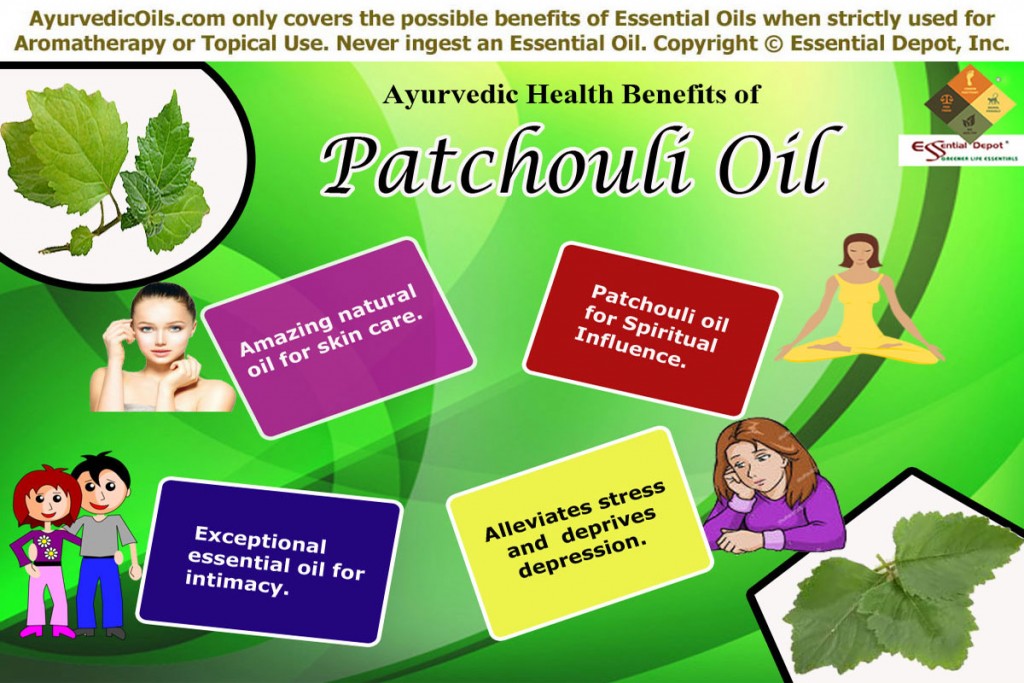 Patchouli is one among those best essential oils for skin care. The cicatrisant property of this oil makes it a perfect companion in quicker healing of cuts and wounds while helping in fading away the marks and scars left by injuries, acne, burns, chicken pox, measles, stretch marks etc.
Patchouli is one among those best essential oils for skin care. The cicatrisant property of this oil makes it a perfect companion in quicker healing of cuts and wounds while helping in fading away the marks and scars left by injuries, acne, burns, chicken pox, measles, stretch marks etc.
Patchouli essential oil is also a good tissue re-generator that promotes the growth of new skin cells. The antiseptic and antifungal properties of this oil helps in healing wounds, burns, boils, sores, eczema, dry skin, rough skin, cracks, excessively dehydrated skin and fungal infections like athlete’s foot.
The astringent effects in Patchouli oil helps in tightening loose skin and muscles especially after weight loss and post-delivery. It stops the sagging of skin effectively and treats contractions of nerves, skin and muscles.
All you need to do to work out these wonders is to add 2 to 3 drops of Patchouli essential oil to gentle carrier oils like jojoba oil or sweet almond oil or to your mild skin creams or lotions and gently massage on the affected area.
2. Patchouli oil for Spiritual Influence:
The rich and energizing aroma of Patchouli essential oil grants mental clarity for many years. Among the seven chakras of the human body, Patchouli essential oil is used for connecting the heart chakra with the sacral and root chakras, where chakra is defined as “The centers of psychic energy located at points along the spinal cord. They are associated with the five elements: earth, water, fire, air and ether. Each chakra corresponds to a specific mantra (sound) and geometric pattern (yantra). Through meditation on these chakras we can gain mastery over our body and each corresponding element.”
Inhaling the aroma of this oil through a diffuser, vaporizer or applying it on the chakra or vital flex points, will aid in discharging jealousy, feelings of insecurity, obsessions and enhance the quality of one’s life to a greater level.
2 drops of Patchouli oil added to potpourri, vaporizer, diffuser or burner during an intense meditation will kindle your confidence, creativity, endurance, will power, self-confidence, self-esteem, positive feelings and the fortitude to live in the present moment.
3. Exceptional essential oil for intimacy:
Ayurveda considers sex as a positive force that helps restore the vital energy of life and is misused; it can be the strongest binding attachment stopping one from attaining higher spiritual reality. Ayurvedic texts does not encourage loveless sex as it considers that sex can be complete and beautiful only when there is intimacy and absolute love between the two partners involved in it.
Robert Svoboda’s translation quotes that “For the perfect love tryst Ayurvedic Scholar Sushruta recommends a full moon night in a bower of flowers, soft silk garments, sweet and intoxicating perfumes, light and nourishing food and sweet music.”
It also talks about the use of sweet perfumes, where the partners are said to bathe in or anoint their body in sensual essential oils like Patchouli essential oil before sex. Adding few drops of this essential oil with natural aphrodisiac properties in your burner or vaporizer is also said to add to the erotic mood and deeper intimacy.
4. Alleviates stress and deprives depression:
Patchouli essential oil is grounding and calming to the mind and body. This extremely versatile oil uplifts the mind, helps overcome depressive feelings, tranquilize the mind and paves way for new hopes ahead. The sweet herbaceous and ethereal floral charm brings peace and harmony for the ruined mind.
Fear, fatigue, anxiety, nervous tension, work pressure and prolonged stress can be cleared by enchanting your limbic system with the classic aroma of Patchouli essential oil. 2 to 3 drops of Patchouli oil added to your diffuser, vaporizer, burner, wrist, pillow or to a tissue assists in strengthening your mental power and wash away depressive thoughts that drain you.
Adding 5 to 6 drops of Patchouli in warm bath before going to bed will invigorate your senses, refreshes your mind and strengthens your immune system. You can also choose to enjoy the benefits of a reviving Ayurvedic massage by blending 4 drops of Patchouli oil in cold pressed Sesame oil followed by a warm bath for lessening stress, depression and other related health conditions.
Other health benefits:
1 drop of Patchouli oil added to a cup of warm water for gargle can assist in treating halitosis or bad breath, strengthening the gums and refreshing your breath all through the day. Adding 3 drops of this oil in calming coconut oil for massage or in bath aids in treating fever, pain, inflammation and tones the entire system by stimulating the metabolic functions and boosts the immune power.
The febrifuge and antiphlogistic properties of this oil aids in reducing inflammation, fever and body pain associated with it. Adding few drops of Patchouli essential oil in your air freshener, burner or vaporizer can keep away from insects like bed bugs, mosquitoes, ants, moths and flies.
Disclaimer:
Pure essential oils are highly concentrated in nature and always use them externally after diluting in appropriate carrier oils. Avoid taking essential oils internally. Seek the advice of your Ayurvedic professional regarding the usage of specific essential oils for your unique constitution and state of health.
The MSDS (Material Safety Data Sheet) of Patchouli essential oil is readily available for your enhanced safety and better usage.
Gas Chromatography Report of Patchouli essential oil.
Thought for the day:
Patchouli has always been a part of my fragrance, like a line through my life. -Julia Roberts
Suggested Reading:
- The Fragrant Mind: Aromatherapy for Personality, Mind, Mood and Emotion by Valerie Ann Worwood
- Jeanne Rose: Herbal Body Book: The Herbal Way to Natural Beauty & Health for Men & Women by Jeanne Rose
- The Essentials of Aromatherapy Essential Oils by Dr Miriam Kinai
- The Illustrated Encyclopedia of Essential Oils: The Complete Guide to the Use of Oils in Aromatherapy & Herbalism by Julia Lawless
Reference Links:

